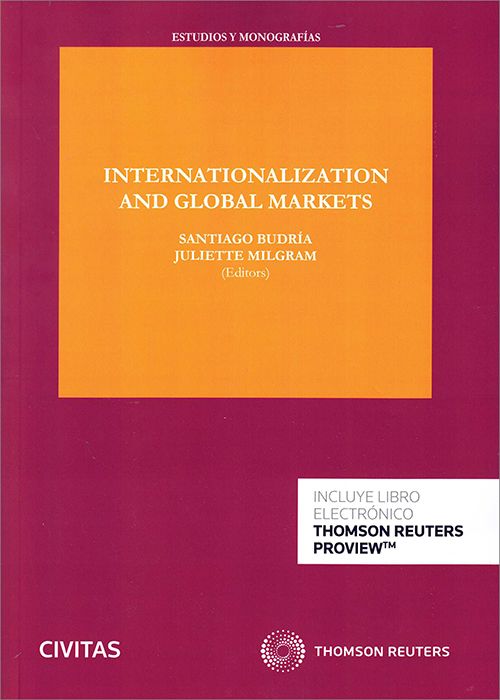Internationalization and global markets
- ISBN: 9788413903163
- Editorial: Editorial Civitas
- Fecha de la edición: 2021
- Lugar de la edición: Pamplona. España
- Colección: Estudios y Monografías de Economía
- Encuadernación: Rústica
- Medidas: 24 cm
- Nº Pág.: 247
- Idiomas: Español

This work brings together the contributions of 16 specialists in the area of globalization and the internationalization of firms. From different perspectives and methodologies, the authors offer a rigorous and complementary vision on current issues in the area, such as the process of digitization and globalization in the labor market, internationalization in the education sector, and the relationship between internationalization processes and employment, banking, total factor productivity, corporate social responsibility and game theory.
CAPÍTULO 1 EL EMPRENDIMIENTO COMO DESARROLLO PROFESIONAL EN UNA EUROPA INTEGRADA: ¿LA NUEVA NORMALIDAD?
People development through entrepreneurship in an integrated Europe: the new normal?
RAQUEL ORTEGA-LAPIEDRA
JUAN CARLOS CAMPAÑA
1.Introduction
2.People Development in an integrated Europe. A snap
3.A new workforce context?
3.1.Silver Economy
3.2.A work redefined. The new normal?
3.3.How to compete with outdated skills? The new required skills
4.How can Europe harness its workforce active and productive? And, how can compete with?
5.In this new normal context, is the entrepreneurship an opportunity, a passion or a fashion movement that match with other society or cultural values?
6.Conclusion
References
CAPÍTULO 2 LA DIGITALIZACIÓN Y LA INTERNACIONALIZACIÓN DEL TRABAJO
Digitization and the internationalization of labour
ESTRELLA GÓMEZ-HERRERA
FRANK MÜLLER-LANGER
1.Introduction
2.The future of work? Automation and fears of robotization
3.Online labour markets
3.1.New business models
3.2.Who are the ‘gig workers’?
4.Economic and social implications of OLMs
4.1.Competition
4.2.Creation of trust
4.3.Legal status of workers
4.4.Labour conditions and psychological effects
4.5.Gender wage gaps
5.Internationalization of labour and OLMs
6.Conclusions
References
Figures and tables
CAPÍTULO 3 INTERNACIONALIZACIÓN E INTEGRACIÓN EUROPEA: UNA APROXIMACIÓN DESDE LOS C
Internationalization and European integration: an analysis of international branch campuses in Spain
CRISTINA VILLÓ SIREROL
JAVIER MUÑOZ DE PRAT
MARIA ESCRIVA BELTRAN
1.Introduction
2.European educational institutions and the Bologna European framework
3.The internationalisation of organisations
3.1.General theory
3.2.Modes of international market entry for companies
4.HE institutions and internationalisation
4.1.The internationalisation of HE
4.2.IBC: Concept and characteristics
4.3.IBC entry modes in other countries
4.4.IBCs in Europe
5.BCs in Spain
5.1.IBCs exported by Spanish universities
5.2.Foreign university IBCs in Spain
5.2.1.Berklee College of Music – Valencia, Spain
5.2.2.Saint Louis University – Madrid
5.2.3.Schiller International University, Madrid Campus
5.2.4.Ecole Supèrieure de Commerce de Paris (ESCP)
5.2.5.Toulouse Business School Barcelona
6.Conclusions
References
CAPÍTULO 4 INTERNACIONALIZACIÓN EMPRESARIAL Y DECLIVE DEL EMPLEO EN EL SECTOR MANUFACTURERO ESPAÑOL
Business internationalization and employment decline in the Spanish manufacturing sector
JOSÉ LUIS GROIZARD
1.Introduction
2.Theory and evidence
3.Empirical facts
3.1.Data
3.2.Job flows
3.3.Trade and employment
4.Model and estimation
4.1.Trade modes and employment
4.2.Sourcing mode and employment
5.Conclusion
References
CAPÍTULO 5 LA MEDICIÓN DE LA PRODUCTIVIDAD TOTAL DE LOS FACTORES Y LA HIPÓTESIS DEL APRENDIZAJE MEDIANTE LA EXPORTACIÓN
The measurement of total factor productivity and the learning by exporting hypothesis
DOLORES AÑÓN HIGÓN
JUAN A. MÁÑEZ
MARÍA E. ROCHINA-BARRACHINA
JUAN A. SANCHIS LLOPIS
1.Introduction
2.Measuring Total Factor Productivity
2.1.Index numbers
2.2.Econometric methods
2.2.1.Endogenous Markov Process
2.2.2.Cobb-Douglas vs. Translog production function
2.3.Omitted Price Bias
3.Data and descriptive analysis
4.The effects of exporting on firm-level TFP measures: The LBE hypothesis
5.Concluding remarks
References
Appendix
CAPÍTULO 6 UN CÍRCULO VIRTUOSO: INTERNACIONALIZACIÓN, RESPONSABILIDAD SOCIAL CORPORATIVA Y PERFORMANCE FINANCIERA
A virtuous circle: corporate internationalization, corporate social responsibility, and corporate financial performance
GUILLERMO BADÍA
1.Introduction
2.Corporate internationalization and financial performance
3.Internationalization as a driver of CSR
4.Other CSR determinants
5.Reactive or proactive approach of CSR
6.Is doing good while doing well?
7.Empirical evidence on the link between CSR and financial performance
8.The three-baseline link
References
CAPÍTULO 7 EL DÉFICIT COMERCIAL ESPAÑOL Y RAZONES A FAVOR DE UN BANCO INTERNACIONAL DE PAGOS
Spanish trade deficit and reasons for international central banking
ANDREA CARRERA
1.Introduction
2.Foreign exchange reserves and BoPs imbalances: Spain as net importer
2.1.Foreign exchange reserves
2.2.Foreign exchange reserves and international trade: BoPs discrepancies
3.International money transfers and foreign investments
4.Net commercial imports
5.International trade and international central banking
6.Conclusion
References
CAPÍTULO 8 EL JUEGO DE LA INTERNACIONALIZACIÓN: COOPERAR O NO COOPERAR
The internationalization game: To cooperate or not to cooperate
OMAR DE LA CRUZ VICENTE
FERNANDO TOMÉ BERMEJO
1.Introduction
2.Basics
2.1.From Nash Equilibrium to Pareto Optimum
2.2.From the optimum pareto to the Equilibrium of Nash
2.3.Perfect Nash Equilibrium in Subgames
3.Games between companies within a market
4.Games with imperfect information
5.International trade games
References






